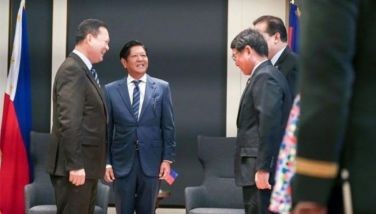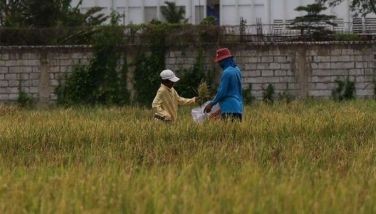Muslim leaders help rebuild conflict-affected Mindanao
December 26, 2001 | 12:00am
Kidapawan City, Cotabato – Local Muslim leaders here are personally taking the cudgels in helping families displaced by armed conflicts so they could lead normal lives again.
Such "people-to-people" initiatives are shown in the initial results of household surveys and interviews conducted in conflict-affected areas by non-governmental organizations commissioned by the World Bank under a Mindanao Social Assessment Project (SAP).
"The local leaders have accommodated displaced families and provided them with sites to put up their houses and farm plots for their livelihood," said Damaso Vertido, executive director of Mindland Foundation, one of the NGOs undertaking the SAP.
"For instance, in Sitio Budsi of Barangay Natutungan, Municipality of Matalam, a former MNLF commander who is also the datu or local chieftain has accommodated 50 displaced families in his farmland, where they put up their respective houses and tend farm plots for vegetables and other cash crops."
Vertido added that in the same barangay, the Sangguniang Bayan or municipal council has likewise initiated the resettling of another batch of 60 displaced families.
"We have noticed that in resettlement areas initiated by local officials and Muslim leaders, the affected families are manifesting normal lives again. Most of them are now pre-occupied, engaging in bio-intensive gardening and others are busy raising poultry and livestock animals like chicken, ducks and goats," Vertido said.
"The help extended by the local leaders and the community as a whole is usually based on family and kinship ties, as well as on local and informal structures of power," explained Vertido.
However, their decision to help resettle displaced families are not totally due to the local leaders’ or their kins’ philanthropic inclinations. By accommodating the displaced families, many of whom are their relatives, the local leaders are assured by farmlands during planting and harvesting seasons, explained Vertido.
The same trend was also observed in other communities in Cotabato, where there are other hundreds of families displaced by armed conflicts, according to community organizers of the Community and Family Services International (CFSI), another NGO conducting rehabilitation and reconstruction activities in conflict-affected areas in Cotabato and Maguindanao.
In all, these "people-to-people" initiatives – that entail no cost to the government – are not only effective but also are a faster way in bringing back normality to the lives of many displaced families and in reconstructing conflict-affected communities, Vertido noted.
For its part, government should build on the gains of such initiatives by providing the needed rural infrastructure like irrigation systems, farm-to-market roads, post harvest and marketing facilities, and financial assistance.
"This is basically the design and intention of the SAP, according to team leader Dr. Fermin D. Adriano. The needs and aspirations of displaced families and conflict-affected communities – as determined through household surveys, group discussions and interviews – will serve as inputs in the formulation of government plans for their rehabilitation and reconstruction, noted Adriano, who serves as president of the Foundation for Rural institution, Economics and Development, Inc. (FRIEND).
Aside from Mindland and FRIEND, the other NGO participating in the WB-funded Mindanao SAP is MinPhil, Inc.
In all, a total of 188,575 families, comprising of 1,002,855 persons have been affected by the armed clashes between government troops and the Moro Islamic Liberation Front (MILF) last year, according to figures gathered by the Department of Social Welfare and Development (DSWD) as of Nov. 6, 2001. Casualties have reached more than a thousand persons.
Of the total, 49.5 percent (93,448 families or 514,570 persons) were from the Autonomous Region of Muslim Mindanao; 42 percent (79,556 families or 414,304 persons) from Region 12; 5.3 percent (10,129 families or 52,179 persons) from Region 11; and the rest (5,442 families or 25,523 persons) from Region 9.
Government has put up as much as 490 evacuation centers to accommodate affected families. The war has damaged a total of 9,036 houses, of which 71 percent (6,455) were either burned or totally destroyed.
As of November 2001, government has spent some P350.2 million to address the plight of IDPs in the form of relief and medical supplies and assistance; construction of bunk houses, core shelters and evacuation centers; food for work during the construction of shelters and bunkhouses; and administrative expenses. The DSWD shared the bulk at P274.2 million (78 percent), other government agencies and NGOs contributed P54.6 million, and local government units provided P21.4 million.
Such "people-to-people" initiatives are shown in the initial results of household surveys and interviews conducted in conflict-affected areas by non-governmental organizations commissioned by the World Bank under a Mindanao Social Assessment Project (SAP).
"The local leaders have accommodated displaced families and provided them with sites to put up their houses and farm plots for their livelihood," said Damaso Vertido, executive director of Mindland Foundation, one of the NGOs undertaking the SAP.
"For instance, in Sitio Budsi of Barangay Natutungan, Municipality of Matalam, a former MNLF commander who is also the datu or local chieftain has accommodated 50 displaced families in his farmland, where they put up their respective houses and tend farm plots for vegetables and other cash crops."
Vertido added that in the same barangay, the Sangguniang Bayan or municipal council has likewise initiated the resettling of another batch of 60 displaced families.
"We have noticed that in resettlement areas initiated by local officials and Muslim leaders, the affected families are manifesting normal lives again. Most of them are now pre-occupied, engaging in bio-intensive gardening and others are busy raising poultry and livestock animals like chicken, ducks and goats," Vertido said.
"The help extended by the local leaders and the community as a whole is usually based on family and kinship ties, as well as on local and informal structures of power," explained Vertido.
However, their decision to help resettle displaced families are not totally due to the local leaders’ or their kins’ philanthropic inclinations. By accommodating the displaced families, many of whom are their relatives, the local leaders are assured by farmlands during planting and harvesting seasons, explained Vertido.
The same trend was also observed in other communities in Cotabato, where there are other hundreds of families displaced by armed conflicts, according to community organizers of the Community and Family Services International (CFSI), another NGO conducting rehabilitation and reconstruction activities in conflict-affected areas in Cotabato and Maguindanao.
In all, these "people-to-people" initiatives – that entail no cost to the government – are not only effective but also are a faster way in bringing back normality to the lives of many displaced families and in reconstructing conflict-affected communities, Vertido noted.
For its part, government should build on the gains of such initiatives by providing the needed rural infrastructure like irrigation systems, farm-to-market roads, post harvest and marketing facilities, and financial assistance.
"This is basically the design and intention of the SAP, according to team leader Dr. Fermin D. Adriano. The needs and aspirations of displaced families and conflict-affected communities – as determined through household surveys, group discussions and interviews – will serve as inputs in the formulation of government plans for their rehabilitation and reconstruction, noted Adriano, who serves as president of the Foundation for Rural institution, Economics and Development, Inc. (FRIEND).
Aside from Mindland and FRIEND, the other NGO participating in the WB-funded Mindanao SAP is MinPhil, Inc.
In all, a total of 188,575 families, comprising of 1,002,855 persons have been affected by the armed clashes between government troops and the Moro Islamic Liberation Front (MILF) last year, according to figures gathered by the Department of Social Welfare and Development (DSWD) as of Nov. 6, 2001. Casualties have reached more than a thousand persons.
Of the total, 49.5 percent (93,448 families or 514,570 persons) were from the Autonomous Region of Muslim Mindanao; 42 percent (79,556 families or 414,304 persons) from Region 12; 5.3 percent (10,129 families or 52,179 persons) from Region 11; and the rest (5,442 families or 25,523 persons) from Region 9.
Government has put up as much as 490 evacuation centers to accommodate affected families. The war has damaged a total of 9,036 houses, of which 71 percent (6,455) were either burned or totally destroyed.
As of November 2001, government has spent some P350.2 million to address the plight of IDPs in the form of relief and medical supplies and assistance; construction of bunk houses, core shelters and evacuation centers; food for work during the construction of shelters and bunkhouses; and administrative expenses. The DSWD shared the bulk at P274.2 million (78 percent), other government agencies and NGOs contributed P54.6 million, and local government units provided P21.4 million.
BrandSpace Articles
<
>
- Latest
- Trending
Trending
Latest
Trending
Latest
Recommended





























